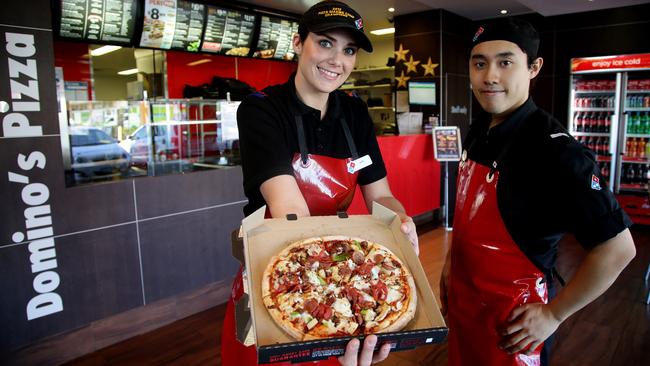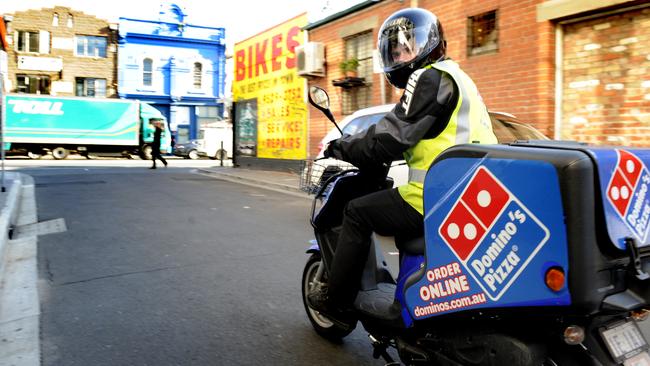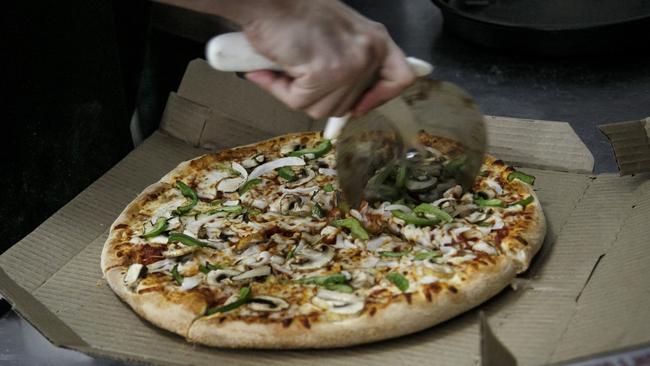Carpark bid to bring Domino’s Pizza store sales back
The appetite for Domino’s Pizza remains piping hot, but one simple idea has boosted takeaway sales during the coronavirus pandemic.

Retail
Don't miss out on the headlines from Retail. Followed categories will be added to My News.
Domino’s pizzas continue to be gobbled up as the pandemic drives demand for online-ordered delivery food, while the company is trying to improve takeaway sales by walking them out to carparks.
Global food sales for the six months to December 31 jumped 16.5 per cent to $1.84bn, while online sales soared more than 25 per cent and underlying net profit rocketed nearly 33 per cent to $96.2m.
But group chief executive and managing director Don Meij said the pleasing result reflected the execution of a long-term strategy rather than one-off costs or short-term sales attributable to COVID-19.
“Despite the unique challenges of this time, store openings have accelerated with an average of five new stores opening each week, which reflects the confidence Domino’s, and our franchisees, share in our future,” Mr Meij said on Wednesday.
“We intend to significantly outperform this strong result in the second half.”

Domino’s opened 131 new stores — representing 5 per cent of the global network — with a whopping 68 of those in Japan, where growth was particularly strong.
France got 19 new stores while 15 opened in Germany, surpassing the European nation’s previous record for store additions in the first half.
In Germany, record numbers of customers were served, Mr Meij said.
“There is no doubt that Japan and Germany have exceeded already high expectations for heightened order volumes, with additional COVID-specific growth,” he said.
“Our view is COVID-19 has brought forward long-term demand for delivered food, ordered online, in all markets.
“At the same time, carry-out orders remain challenged in most markets, as specific customer segments including CBD office lunches have changed their ordering behaviour.

“This has affected individual countries differently. In some markets, the growth in delivery sales has more than offset the changes in carry-out customers, in others same store sales growth remains lower than expectations in the short-term.”
In Australia and New Zealand, sales rose 5.7 per cent and 13 new stores were added, which the region’s chief executive Nick Knight attributed to improving the quality of the franchisee network, who had risen to the challenge of serving more customers.
Delivery growth remained strong, and while carry-out sales were hampered in some markets by COVID-19 restrictions, there had been efforts to bring them back through carpark delivery, Mr Knight said.
He said customer satisfaction levels were higher while franchisee profitability had hit record levels.

Wealth management group Citi said the overall result was strong but “soft” in Australia, with margins largely steady as costs rose.
Food and paper prices jumped 26 per cent while marketing costs lifted 19 per cent.
“The fundamental debate will be what is transitory and what is more permanent in the level of growth the company has achieved in calendar 2020,” Citi said.
On the group’s outlook, Mr Meij said expectations for the full-year performance were “even higher than our already positive, medium-term outlook” and the plan was to speed up expansion, with management actively seeking attractive locations.
Citi said it expected more upgrades to the full year result, but they would be “limited”.
Domino’s declared a 50 per cent franked interim dividend of 88.4 cents per share, up 33 per cent.
Originally published as Carpark bid to bring Domino’s Pizza store sales back


